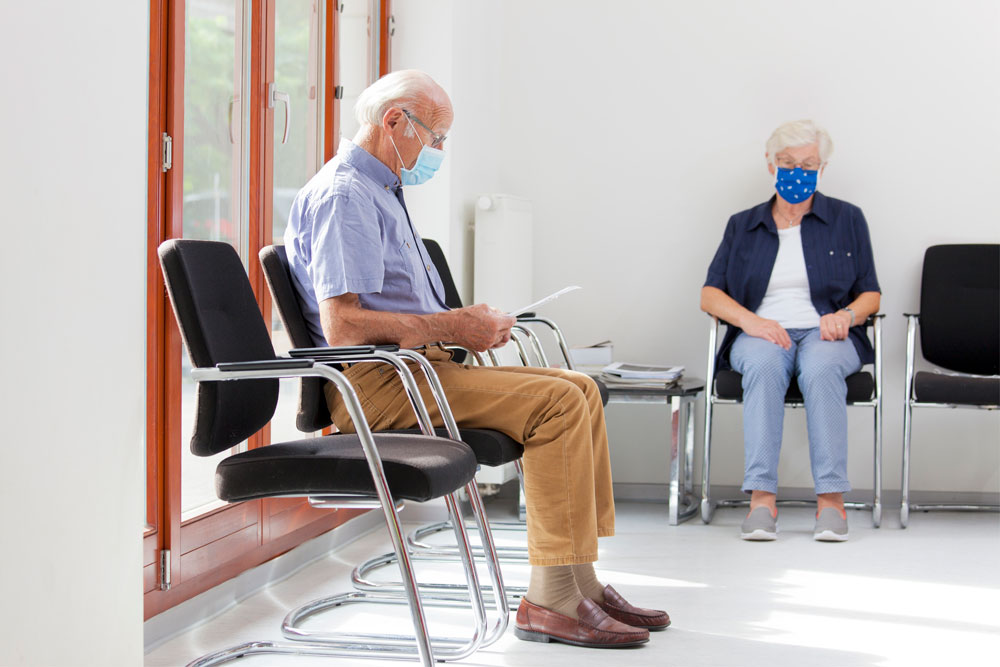One Year Later: Looking Back on a Year With COVID-19 and What We Know Now
March 4, 2021
This month marks one year since the coronavirus pandemic reached South Carolina. Now the state nears 8,000 deaths from the virus and almost 500,000 confirmed cases, according to the South Carolina Department of Health and Environmental Control.
A lot has changed in 365 days. BlueCross BlueShield of South Carolina’s Chief Medical Officer Dr. Matt Bartels shares some insight on what we have learned, recommendations for staying safe now and what to expect in the months ahead.
Should people still be wearing masks?
Yes. People should follow the Centers for Disease Control and Prevention (CDC) recommendations on preventing the spread of the virus. We know that the virus is spread through respiratory droplets, and evidence shows that masks are effective, especially indoors when there are other people around.
What are some of top concerns right now with the pandemic?
The main one on all our minds is understanding the duration of the pandemic. How much longer will this go on? Many are speculating on when we will reach herd immunity. Herd immunity is the resistance to the spread of a contagious disease within a population that results if a sufficiently high proportion of individuals are immune to the disease, especially through vaccination. A related concern is whether most of the population would be willing to receive the vaccine. If people refuse to get the vaccine it could potentially prolong the length of the pandemic. It would take longer to get to the necessary critical mass of population that has some degree of immunity.
There are also concerns around health disparities based on race and socio-economic status, access to preventive vaccinations, and treatment for certain populations. Finally, the mental health impacts are quite significant and merit attention for all age groups.
Are there groups that have been affected more by the pandemic?
Certain non-white racial groups like African Americans are impacted by COVID-19 at higher rates. People with chronic conditions such as diabetes, hypertension and obesity are more affected. As a group, these individuals experience higher rates of adverse outcomes.
Have the symptoms changed?
The symptoms have not necessarily changed, but we do know more about the virus and individuals’ experiences now. The challenge has been that there is a spectrum of symptoms from being asymptomatic to those that cause death. This is probably what confuses and concerns most people. I’m sure many people have known individuals who have had COVID, some very severely. Almost 8,000 South Carolinians have died. But the majority of people do not die and will recover from the virus. The death rate is not as high as originally thought, but it is still significant.
What has changed with COVID-19?
Most of the self-care guidance has not changed. If you have symptoms you should quarantine and call your doctor. When you quarantine, you should remove yourself so that you do not expose others. More information about how to quarantine at home can be found on the CDC website.
What has changed is the availability of testing and easier access to consult with a doctor through telemedicine. Individuals who have been exposed or have symptoms should consult with a health care provider.
How has the care or treatment for COVID-19 changed?
The care for COVID-19 has evolved as scientists and researchers explore new ways to potentially prevent or mitigate the severity of the disease. There are several treatments that are being studied and show promise in the clinical trial data. At the same time, a few of the early treatments that were thought to be potentially impactful have been disproven from an effectiveness standpoint. It is important to get new therapies to the market, but it is also important to ensure that the appropriate rigor is being applied as to how they’re evaluated so that no harm is done as well.
Have we learned anything new about COVID-19 and children?
There is still a lot to learn here. Thankfully, we know that in general, children appear to be much less affected by COVID-19. However, a new condition called Multisystem inflammatory Syndrome has been identified and is associated with COVID-19 infection in some children. Although very rare, it is concerning.
We also know, like adults, children with certain chronic conditions tend to be at higher risk for more severe infection from COVID-19.
Do we know anything about the long-term effects of COVID-19?
We don’t have all the insights here yet. There is going to be a lot of ongoing evaluation and research as to the potential long-term effects of COVID-19. What we do know is that in some patients it causes fairly significant inflammation in the lungs. What hasn’t been answered is whether people will go back to normal lung function or if there is an ongoing impairment. There is also active research into patients with prolonged courses or extremely long recovery periods. All of this will be evaluated in the months and years to come.
Are there any activities people should consider avoiding?
To the best of your ability, avoid activities that would put you at unnecessary risk. For example, being in crowded situations with poor air ventilation. If you are around people you do not live with, take precautions, such as wearing a mask and social distancing by staying six feet away from others. These are precautions we all must live with until the spread of the virus has significantly slowed down.
We are getting close to allergy season. What are some ways to know the difference between allergies or common colds and COVID-19?
The CDC has great resources to help people tell the difference between COVID-19 and other types of sickness. One of the key differentiators is that you typically don’t have a fever with allergies or severe systematic symptoms, such as body aches, muscle aches and extreme fatigue.
What do we know about the new strains of the virus?
It is not unusual for a virus to mutate. That is just what viruses do as they spread through communities trying to evade our defenses. We know that new strains originated in the UK, South Africa and elsewhere. We will continue to see mutations of this virus from all parts of the globe. Some of these are likely more contagious. That doesn’t mean that they cause more severe illness, but they probably spread easier from person to person. We are learning that several of the current vaccines likely confer some degree of immunity to the strains, but not all of them. This is also an area of active research.
One unknown is whether the vaccines are going to continue to be as effective as new variants emerge. The variants are not unexpected, but the way to prevent the emergence of additional mutations is to achieve herd immunity in the population. By doing this the virus loses the ability to jump from person to person and therefore is less effective at mutating.
When do you think things may go back to “normal”?
Most experts think that if vaccine rollout continues through spring that there is potential that later this year there may be some reduction of restrictions. There are a lot of factors that will contribute to when things might return to some sense of normal. It's not going to be the same “normal” that we had over a year ago. It's going to be a new, modified way of living, and mask use and other precautions will likely continue for some time.
Anything else you’d like people to know?
This pandemic has had a major impact on people’s mental health and social interactions. It is important that people remember to get outside as the weather improves and socially interact with others safely. Connect with others virtually. This has been a difficult time for us all. Looking ahead, we know that the pandemic is not likely to continue forever. We are going to continue to develop new treatments and I firmly believe the virus will become manageable. Vaccines are going to help control this virus. There is a light at the end of the tunnel. It is just going to take more time. Be patient and be vigilant, but also be hopeful. And remember to take care of one another.
Related Reading:
 Protect Yourself and Others: The Importance of Vaccines and the Flu Shot
Protect Yourself and Others: The Importance of Vaccines and the Flu Shot
Undoubtedly, vaccines have been on everyone’s mind since the start of the pandemic. Several vaccines for COVID-19 are under development. Here are the basics on vaccines and the flu shot and why you should make sure you and your family members are up to date on your vaccines.
Read More Coping With COVID-19 and Seasonal Depression
Coping With COVID-19 and Seasonal Depression
The days are getting shorter and COVID-19 cases are spiking. Increased stress because of the pandemic and its companions — isolation, the challenges of navigating kids’ education schedules, potential economic hardship, a polarized political climate and the fear of, or reality of, losing loved ones — all add to the mental health burden people are feeling right now. Together, all this may make this winter more difficult.
Read More A Primary Care Doctor on COVID-19: What to Know
A Primary Care Doctor on COVID-19: What to Know
The coronavirus pandemic has raised dozens of questions. We spoke with one of BlueCross' doctors to get answers to some common questions.
Read MoreCOVID Update
The COVID-19 public health emergency (PHE) ended May 11, 2023. The COVID-19 national emergency ended April 10, 2023. The standard terms of your health plan or policy now apply to any COVID-19 related services. Please review your schedule of benefits if you have any questions.




















